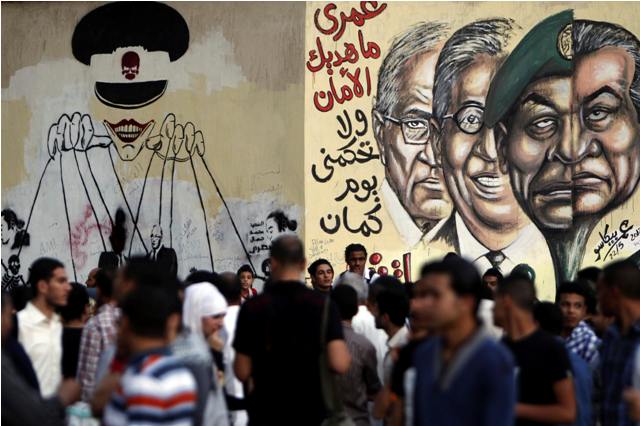
It is no exaggeration to say that events over the next ten days will determine whether Egypt’s troubled transition is headed into calmer waters or into a vortex. If all goes well, by June 21 Egypt will have a new president recognized as freely elected and a 100-member constituent assembly that will begin the long-delayed process of writing a new constitution. If not, the country could face widespread protests and political chaos on a scale not seen since the February 2011 uprising. The schedule of events is dizzying:
- On Tuesday June 12, parliament is to convene in a joint session to elect the 100-member constituent assembly according to a carefully constructed formula reached in negotiations last week that would balance Islamists and half non-Islamists. The Supreme Council of the Armed Forces (SCAF) has insisted that the assembly be appointed before the presidential election, probably because the SCAF fear that Freedom and Justice Party (FJP) candidate Morsy will win and they do not want the Muslim Brotherhood to control the assembly in addition to the parliament and the presidency. (So the SCAF is finally coming around to the logic that Egyptian liberals such as Mohammed ElBaradei argued for from the beginning of the transition: that it is best to select a constituent assembly when political forces are still amenable to compromise, before they have tested their strength fully via the ballot box. Better extremely late than never, perhaps.) But on Sunday, serious differences emerged among the various parties about the criteria for “non-Islamists”—do they include the moderate Islamist Wasat Party, for example, or the Sunni Orthodox bastion of al-Azhar?—and liberals began walking out once again, as they did during the first attempt at forming an assembly in March. Unless a compromise emerges very quickly, the SCAF might end up delivering on its threat of issuing a supplementary constitutional declaration spelling out presidential powers before the election, which in turn could provoke protests depending on what it says.
- On Thursday June 14, the Supreme Constitutional Court could possibly rule to eliminate presidential candidate Ahmad Shafik from the race and also to dissolve the parliament. The former seems unlikely, as most Egyptian legal thinkers believe the law to disenfranchise Mubarak-era officials such as Shafik will be deemed unconstitutional. But Egyptian court rulings are difficult to predict. Elimination of Shafik would throw the race into chaos and probably result in significant delay in the election. Far more likely is that the Court will rule in a separate case that as aspect of the parliamentary election law (specifically, the fact that political parties were allowed to run candidates for independent seats as well as party list seats) was unconstitutional and that the recent parliamentary elections must be rerun partially or completely. This will be political dynamite, as it will ignite what has become an ugly dispute between the increasingly assertive parliament and elements of the judiciary seen as close to the old regime.
- On Saturday June 16 and Sunday June 17, Egyptians will vote in the runoff round of the presidential election. At the moment, people are predicting a small turnout—fewer than the 45 percent who voted in the first round—due to widespread unhappiness with the two remaining candidates and the likelihood of boycotts and spoiled ballots. The late 2011 parliamentary elections and mid-May first round of the presidential elections were run competently and transparently enough to satisfy most Egyptians, so the assumption is that this round will be also, but the fact that the Presidential Electoral Commission’s decisions cannot be appealed in court remains a concern. In any case, let us hope that relations between the judiciary and the voters do not deteriorate to the point where judges refuse, in large numbers, to supervise the election.
- By Tuesday June 19 or so, the winner should be announced. Hard to call at this point, but the numbers seem to favor Morsy (who won 26 percent in the first round), especially now that independent Islamist Abdel Moneim Aboul Fotouh (who got about 17 percent) has explicitly endorsed him, which could help deliver Salafi as well as Brotherhood votes. Morsy is also more likely than Shafik to get some of the 20 percent of votes that originally went to Nasserist Hamdeen Sabbahi, although many of those voters will boycott. Shafik can rely on his original 25 percent plus most of the 11 percent that went to Amr Moussa, but other than that he would need to rally voters who did not show in the first round in order to win—not impossible, but a major challenge for ancient regime forces now trying to rally again.
In the best case scenario after June 20—that a president is elected and accepted by most Egyptians as legitimate—a new issue of political balance will emerge. There are now two major centers of political power in Egypt—the military and the parliament—and the election will create a third in the presidency. Shafik would tip the balance of power toward the military and Morsy toward the parliament; unfortunately neither would play a balancing role. That will be left to other players including the constituent assembly (when it is actually formed), the judiciary, and civil society.
In the worst case, by next week the constituent assembly will not have been formed, the parliament will have been dissolved by court order, and the presidential elections—and the transition back to civilian rule–will be either delayed or of dubious legitimacy, throwing what my former colleague Nathan Brown has called “the stupidest transition in history” from confusion into chaos. Stay tuned.
Michele Dunne is the director of the Atlantic Council’s Rafik Hariri Center for the Middle East.
Photo Credit: Reuters
Image: 2012-06-05t124637z_2037064673_gm1e8651l4n01_rtrmadp_3_egypt-election-protest_0.jpg
